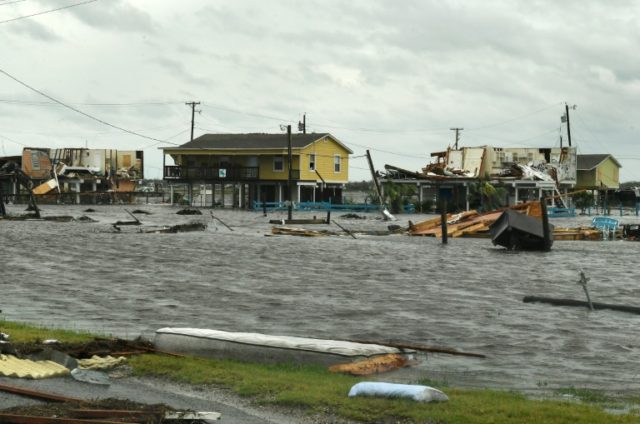Victoria (United States) (AFP) – On a damp sheet of wood, hastily nailed across a ground floor window of a white clapboard house is scrawled a desperate plea: “God help all of us.”
Tree branches, broken down vehicles and building debris lay scattered in the streets of Victoria, Texas on Sunday — and still the rain fell.
Brock Long, the head of the Federal Emergency Management Agency, has warned his recovery teams will be at work in Texas “for years” after Hurricane Harvey’s passage.
But in Victoria — a community of 67,000 on a crossroads between Houston, San Antonio and Corpus Christi — residents are just trying to make it through the coming days.
“We have no water right now,” said John Moraida, who has lived in Victoria for 13 years, arriving after the last hurricane blew through in July 2003.
Then, Hurricane Claudette left 90 percent of the city without power, but there has been nothing to compare to Harvey since the devastating Hurricane Carla in 1961.
“I sat in the sunroom here and watched all the destruction happen, all the roofs flying off the houses, the trees falling down over here — it was really bad,” Moraida said.
“The only water we have, we have to go get it or what we’re doing is collecting water where it’s raining (so) we can flush the commodes and stuff,” Moraida said.
Harvey’s wind speed slowed as it rolled over the Gulf Coast and swept slowly but inexorably inland — but the torrential rainfall only worsened.
Meteorologists already calculate that nine trillion gallons of water have fallen on Texas, and another five to ten trillion could fall by Wednesday.
– ‘We can’t run things’ –
Victoria, along with the sprawling Houston area and the oil refineries of Corpus Christi and Galveston, are under the the heaviest storm in US history.
And, so the residents have questions. Are they safe now?
Teresa Reeder had no trouble listing her concerns.
“Of course the water, and the electricity. Of course the water because of the bacteria that is in the water. The electricity because — if nothing else — we can’t run things,” Reeder said.
“As far as being cool, people can get over that. But we need water for our refrigerators, for food, and everybody staying safe.”
At highway intersections, cars and even powerful pick-up trucks are inundated and abandoned. Mobile homes were on their sides.
Residential streets remained knee-deep in water in several places, and as the storm passed, families that walked out to survey the damage were stunned and tearful.
Judy Malak, a town resident for 40 years, had made her preparations but — given the unprecedented scale of the destruction — is not sure how long supplies will last.
“We don’t have electricity — but the downtown area does — and we can’t find any gasoline. And we’re using up the last of our generator gas,” she said.

COMMENTS
Please let us know if you're having issues with commenting.